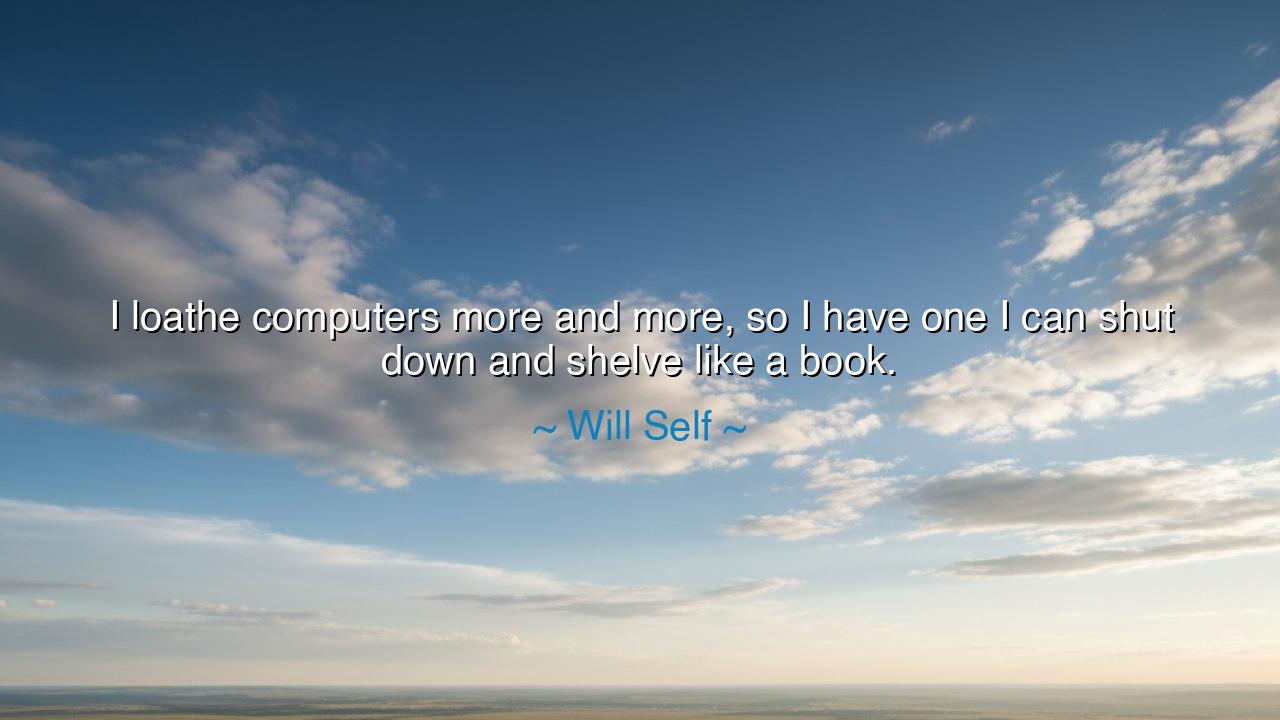
I loathe computers more and more, so I have one I can shut down
I loathe computers more and more, so I have one I can shut down and shelve like a book.






“I loathe computers more and more, so I have one I can shut down and shelve like a book.” Thus spoke Will Self, the British novelist and essayist, whose sharp tongue often conceals the yearning of an old soul trapped in a world that moves too fast. His words are not merely an expression of irritation toward machines; they are a lament for the lost stillness of the human mind, for the days when knowledge was not endless and restless, but contained, contemplative, and alive. Through this paradox — to hate the computer yet still possess one — he confesses the modern struggle: to live among tools that connect us, yet also consume us.
In the ancient days, man’s tools served him as extensions of his will — the hammer to build, the plow to cultivate, the pen to create. But in our time, says Self, the computer has become a mirror of both our brilliance and our bondage. We command it to serve us, yet we kneel before it in silent devotion. It glows at our desks like a false hearth, drawing our gaze and our time, yet offering no warmth. Will Self’s loathing, then, is not hatred born of ignorance, but of understanding. He sees that the machine, in giving us infinite access, also steals from us the sacred act of closure — the finality of putting something away, of ending the day’s labor, of resting the mind.
When Self says he has a computer he can “shut down and shelve like a book,” he reaches back toward an older rhythm of life — one measured not by electricity and endless connection, but by the natural cycle of thought and repose. A book, unlike a screen, demands presence. It has a beginning and an end; it invites the reader to finish, to pause, to walk away and let the words breathe within the soul. The computer, by contrast, is never truly silent. It hums even in rest, luring the mind to return, to scroll, to seek. Thus, Self’s choice to close and shelve his device is an act of rebellion — a return to the dignity of stillness in an age that worships motion.
There is a story of Leonardo da Vinci, that restless genius of the Renaissance, who often left his works unfinished — not out of neglect, but because he believed the mind must rest to create anew. He would walk through fields, watch birds, or study the flow of water, letting his thoughts ferment in silence. If he had lived in our time, perhaps he, too, would have loathed the computer — not because it lacks intelligence, but because it leaves no room for wonder. In Self’s words we hear the same yearning: a desire to step away from the noise, to rediscover the space where imagination dwells undisturbed.
The computer, then, is both tool and test. It can serve knowledge, but it can also enslave attention. To shut it down is more than a mechanical act — it is a spiritual one. It is to say, “Enough.” It is to reclaim the boundary between man and machine, between thought and distraction. Will Self’s disdain becomes a mirror for us all: Do we own our devices, or do they own us? Can we, like him, find the courage to shelve them like books — to walk away, to let the silence of the real world return?
Yet his words are not a rejection of progress. They are a plea for balance — the ancient virtue that has guided all enduring civilizations. Just as fire can warm or destroy, so can technology enlighten or consume. The wisdom lies in knowing when to use it, and when to step away. To “shelve” the computer is to remember that we are not infinite, and neither is our attention. We must rest, reflect, and reconnect with what no machine can replicate: the texture of paper, the sound of wind, the pulse of life itself.
So, dear listener of the modern age, take Will Self’s words as both warning and invitation. Loathe the machine when it becomes your master, but use it wisely as your servant. Let your tools serve your purpose, not shape it. When the day’s work is done, close the lid, power down, and shelve it like a book. Go outside, breathe the air that no algorithm can generate, and let your thoughts stretch once more into the infinite spaces of being.
For in the act of shutting down, you do not abandon progress — you restore your humanity. And that, above all, is the wisdom hidden in Will Self’s loathing: that to live fully in a technological world, one must still know the sacred art of turning it off.






AAdministratorAdministrator
Welcome, honored guests. Please leave a comment, we will respond soon